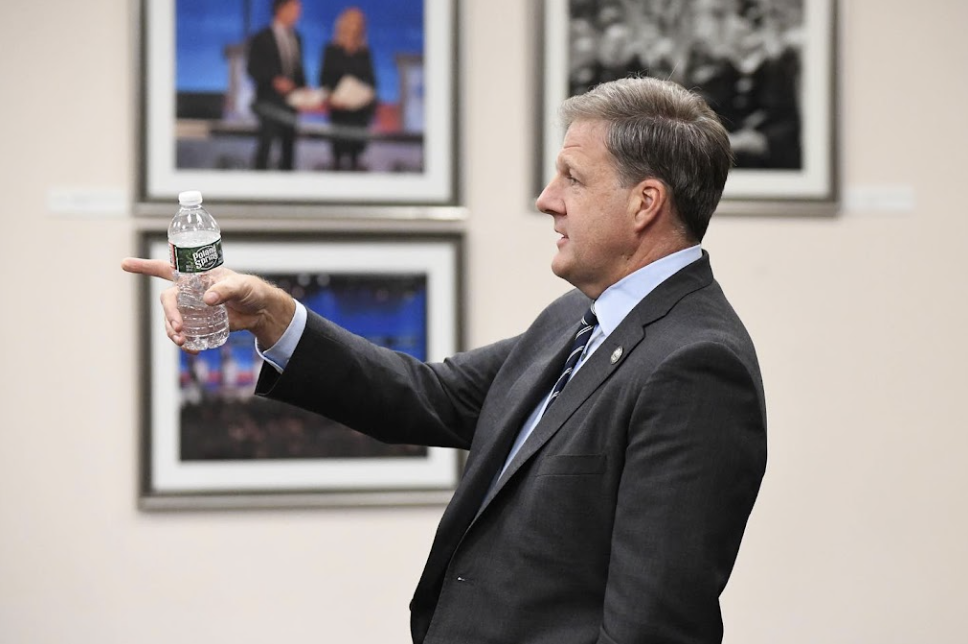On Monday, October 3rd, New Hampshire Governor Chris Sununu was the featured guest of a New Hampshire Institute of Politics Common Ground event entitled “Walking Through Polarization”. While the event was successful in its goal of providing a forum to discuss the effects of political polarization in society, the Governor’s comments at times embodied the polarizing and divisive rhetoric that he was there to disavow.
A large part of the Governor Sununu’s speech centered on the immunity to political polarization found in the Granite State– this immunity is a myth, and the governor is partially at fault. His comments during the first segment of the program pointed to his veto of a gerrymandered congressional district map in 2022. The Governor’s veto was a good decision– the map passed by the legislature was a travesty of the equal representation the legislature claimed to uphold– but it was a drop of water compared to the sea of bad decisions the Governor made with regard to redistricting. The decision to sign distorted district maps at the state level is one that will have wide reaching implications for the next decade.
These maps for the State House, State Senate, and Executive Council signed by the governor all worked as intended in 2022. In all three bodies, statewide, Democratic candidates received more votes than Republican candidates, yet Republicans hold majorities in the State House, State Senate, and Executive Council. These gerrymandered maps received less coverage in the media than the congressional maps despite state-level politics having a larger impact on the individual than national-level politics.
Another comment the governor made that sparked controversy in the audience was on why people are currently less likely to be politically engaged than in the past. When asked about the low pay found in the state legislature, Sununu argued that it was a positive thing. His rationale was that only the most dedicated and available candidates would run. Students in the audience seemed surprised at that answer, but Sununu kept speaking on how the volunteer legislature, as it has been termed, is of benefit to the state. The idea of the volunteer legislature as opposed to the professional legislature only works when qualified and experienced candidates are elected. More often than not, at least currently, the New Hampshire legislature is comprised of wealthy, older people who do not have any specific experience in a field where there is opportunity for relevant legislation.
A professionally paid and staffed legislature would lead to a greater benefit for the people of New Hampshire. The comically large House of Representatives is at times, too chaotic and messy for its own good. Given the close partisan divide, it is likely that the different members, factions, and parties employ various tactics that are not exactly the most ethical to hold an advantage on voting days. A professionally paid legislature also has the added advantage of encouraging members to attend. Many state representatives miss a multitude of voting days for other commitments and that is not good for democracy, for their constituents, and for their ultimate goals. The phrase “professionally paid” means different things to different people. The two-hundred dollars a term, one-hundred dollars a year, is not enough. Members of local library boards of trustees or school board members make more, sometimes substantially more, than state legislators in New Hampshire. To define “professionally paid”, just look to other states and how they pay each legislator. Compensation varies, but states generally pay their legislators anywhere between $100,000/year on the higher end and $70,000 on the lower end for members of a full-time, professional legislature. Part-time legislators generally receive less than $50,000. New Hampshire is the state with the lowest compensation. The second-lowest compensating state is New Mexico, where state legislators are strictly on a volunteer basis and not paid a salary. New Mexico legislators are instead paid $200 per day when the legislature is in session. All other states compensate their legislators ranging from a couple thousand dollars to well over $100,000 found in California and New York.
At a time when political polarization is at an all time high, fanning the flames further is the wrong course of action. A perfect prescription to solve gerrymandering does not exist. Increasing engagement in state legislatures is an easier task, but it is not as simple as increasing compensation– it requires a fundamental shift in how politics is viewed. Governor Sununu’s comments were not as pointed and personable as his words are normally, and that may be a byproduct of his decision not to run for reelection.


